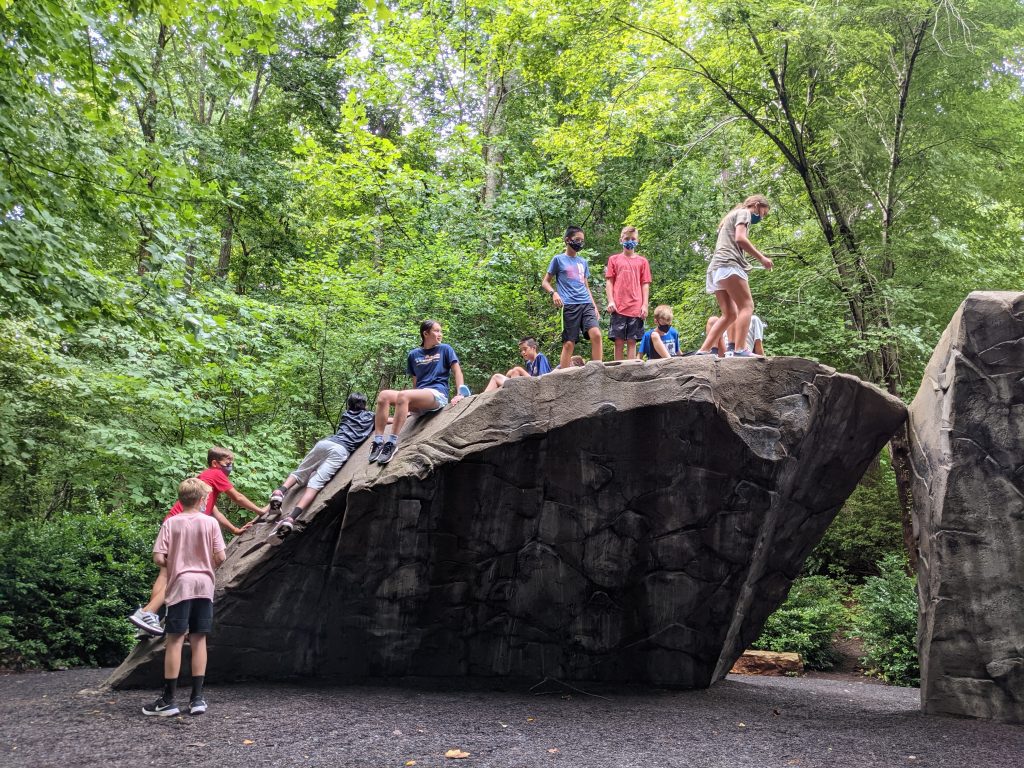On April 1 (no joke), David Brooks published an op-ed in the New York Times entitled How Covid Can Change your Personality. From it, I finally got the words to express what our society has been lacking during pandemic isolation: we’ve lost crucial sources of “emotional nutrition.”
Perfect, isn’t it? Think of it: the small connections we didn’t get to make, the shoulders we didn’t wrap our arms around, the energy we had to put into keeping six feet of distance. For goodness sakes, we lost the bottom half of everyone’s face for a year (or so), making it more challenging to read their cues, to authentically connect even when face-to-face. Over countless moments, in ways small and large, we’ve been emotionally starved for connection.
Brooks goes on to explain that an alarming 61% of young adults report ‘serious loneliness.’ Let that sink in (right next to all those other alarming statistics we’ve been inundated with these days).
“Young adults.” That means Middle and Upper Schoolers; these are our children that are experiencing the real and detrimental effects of emotional isolation. Sure, connecting on social media or playing video games online with friends were lifelines for many last year, but they only go so far.
About the same time that Brooks was explaining that it “feels like not just a social problem but a moral one,” Cary Academy was busy renewing its commitment to its students, community, and purpose–understanding that it is not only our obligation, but our mission, to do so attentively and mindfully.
A school does this in three ways: through the allocation of time, space, and talent. Together, we began reorganizing how we ‘do’ school. In all efforts, we’re guided by considerations of holistic student wellness—physical, social, and emotional—whether it is a continued commitment to reduce homework stress or ensuring that students have ample opportunities to pursue what matters, personally, to them.
In the Middle School, the newly launched C-days—days designed to give some much-needed stress-busting flexibility to the academic calendar—have become “Create!” Days, or “Community!” Days, offering wonderful opportunities for our students to connect, socialize, play together, and learn joyfully. The first C-Day on August 18th was exactly that: a chance to know each other, to bond as a class, to learn technology, and to recognize each other as members of a system bigger than just ourselves. The 8th grade skits during E-Llympics, for example, provided so much humor that our students were breathless. When have we laughed that hard? We couldn’t remember.
In the Upper School, we launched and completed (in a whirlwind summer, whew!) a stunning renovation. Students have returned, wide-eyed, to thoughtfully redesigned spaces that maximize student support and collaboration (and let a whole lot of soul-nurturing natural light in, as well).
In the very near future, we will finally open the new café and student store, which will become a welcome hub of connection and community on-campus.
Across divisions, faculty are engaging in exciting partnerships to design meaningful and diverse experiences for X-Days (the days formerly known as Flex) that allow students to explore, connect, and bond with each other over mutually shared interests.
Finally, we’ve hired amazing new faculty and staff who join an already amazing faculty who love children and their subjects, in that order. (Did I mention they were amazing? It’s worth repeating.)
Like Brooks, we feel an urgent and passionate sense of purpose when it comes to caring for our students–to helping them navigate this challenging world and build strong and nurturing relationships that will sustain them along the way. And, as he says, “… having a feeling of purpose depends on the small acts of hospitality we give and receive each day, sometimes with people we don’t know all that well.”
As we embark on this new academic year, taking the time to greet our families, to truly get to know our students—to learn not only their names, but their personal interests and strengths–are crucial to countering the emotional malnutrition we’ve experienced this last year, to fostering our student’s resilience, and restoring those sustaining connections. And, as a community, we are continually asking ourselves: what have we learned over the tumultuous last year? What silver-lined lessons can we glean and capitalize on to better support our students?
We know can’t go back to the frenzy and overscheduling. Our “learned flexibility” seems to be a superpower now, opening up new potentials for change where we didn’t realize they had existed before.
When the faculty came together for opening meetings this summer, the buildings shook with their excitement and energy. They echoed Brooks’ words as he concludes his powerful article:
I’m also convinced that the second half of this year is going to be more fantastic than we can imagine right now. We are going to become hyper-appreciators, savoring every small pleasure, living in a thousand delicious moments, getting together with friends and strangers, and seeing them with the joy of new and grateful eyes.
We love our students. And we appreciate our parents, who send their children to us every day; we recognize and know the sacrifices and leaps of faith they make in doing so. Our faculty’s commitment to creating a safe and nurturing community is stronger than ever. I know that, together, we can begin to create the post-pandemic world that we—and our students–need.
Sincerely, and “with new and grateful eyes”,


